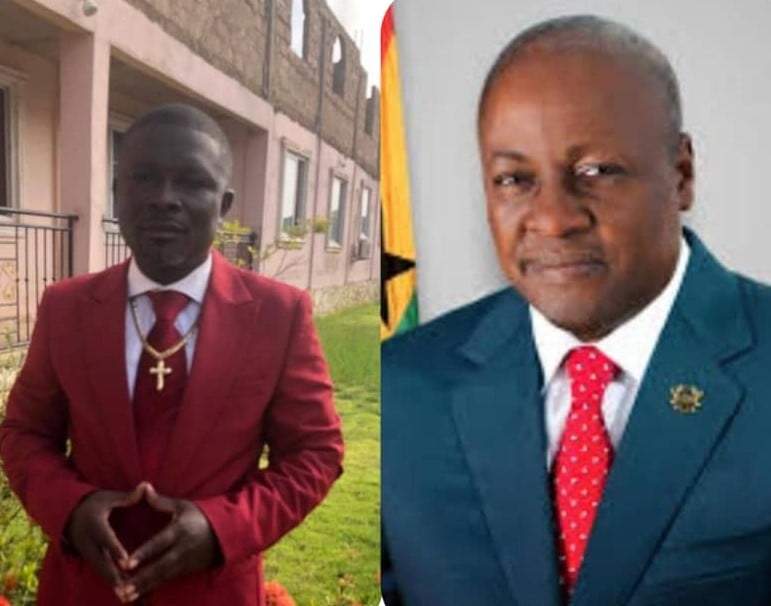Reverend Anthony Kwarteng’s pronouncements paint a complex picture of the intersection of religion and politics in Ghana, alleging a calculated game played by former President Mahama and accusing certain religious leaders of exploiting their positions for personal gain and political manipulation. Kwarteng’s core argument revolves around Mahama’s alleged strategic engagement with what he terms “charlatan prophets” during the election cycle. He posits that Mahama’s invitations to these prophets for prayer sessions were not driven by genuine faith but rather a shrewd political maneuver to neutralize their potential opposition. Kwarteng suggests that Mahama, recognizing the influence these figures held over their congregations, preemptively sought their favor to prevent them from actively campaigning against him, effectively silencing potential dissent and securing a potentially significant voting bloc.
Kwarteng’s narrative delves deeper into the motivations and actions of these so-called “charlatan prophets.” He accuses them of engaging in “prophetic competitions,” vying for recognition and influence by aligning themselves with political figures and making pronouncements about election outcomes. This, according to Kwarteng, creates a distorted religious landscape where prophecy is weaponized for political gain, undermining the integrity of faith and the genuine pursuit of spiritual guidance. He further alleges that these prophets actively participated in the previous administration, led by Nana Akufo-Addo and Vice President Bawumia, contributing to what he describes as a period of “evil” and hindering national progress. This accusation paints a picture of a corrupt nexus between political power and religious influence, where spiritual leaders allegedly forsake their moral compass for personal and political expediency.
Kwarteng’s criticism extends beyond Mahama and the “charlatan prophets” to encompass a broader critique of the role of religion in Ghanaian society. He calls for a return to the core tenets of faith, emphasizing the importance of unity, national prosperity, and genuine prayer. His call for prayer for the current president and for the nation’s socio-economic advancement underscores his belief that the focus should be on the collective good rather than individual or partisan interests. He challenges Ghanaians to critically examine the motivations of religious leaders, urging them to discern between genuine spiritual guidance and politically motivated pronouncements.
Furthermore, Reverend Kwarteng’s critique directly addresses the conduct of religious leaders, specifically pastors. He condemns what he views as the pursuit of personal gain and political influence, urging a return to the fundamental principles of faith and service. He argues that pastors should prioritize the well-being of the nation, promoting goodness and acting as moral compasses, rather than engaging in activities that undermine public trust and exploit their followers. This critique reflects a broader concern about the potential for religious authority to be misused for personal or political gain, ultimately eroding the credibility of religious institutions.
The biblical reference to Matthew 25:36-46, where Jesus speaks about caring for the needy and vulnerable, serves as a moral framework for Kwarteng’s argument. He uses this passage to highlight what he perceives as the hypocrisy of those who claim to be religious but engage in deceitful practices. By referencing this passage, he implicitly contrasts the alleged actions of the “charlatan prophets” with the true spirit of Christianity, emphasizing the importance of genuine compassion and service to others. His warning to Mahama to distance himself from these deceptive figures underscores his concern that the former president is being manipulated and potentially misled by those who prioritize personal gain over the welfare of the nation.
In conclusion, Reverend Kwarteng’s statements offer a stark commentary on the interplay of religion and politics in Ghana. He argues that former President Mahama strategically engaged with certain prophets, not out of genuine faith, but to neutralize their potential political opposition. He further accuses these prophets of being “charlatans” who exploit their religious influence for personal gain and political manipulation. His call for unity, prayer for national prosperity, and a return to the fundamental principles of faith highlights his concern about the distortion of religious values and the erosion of public trust in religious institutions. He challenges both political leaders and religious figures to prioritize the collective good and act with integrity, urging a shift away from self-serving behaviors and towards genuine service and spiritual guidance. His message ultimately emphasizes the importance of discerning between genuine faith and opportunistic manipulation in the complex landscape of religion and politics.














